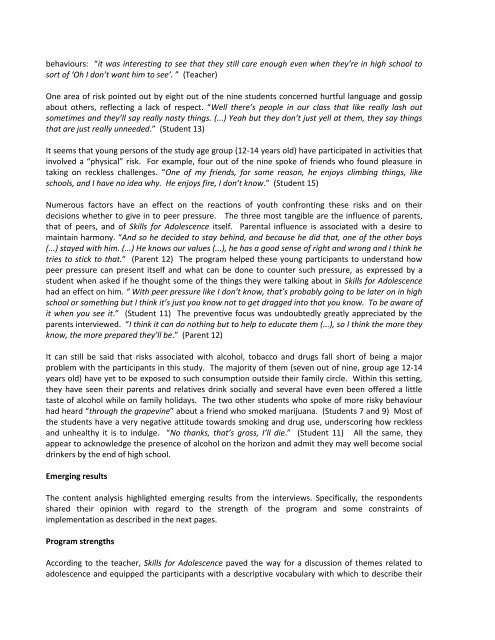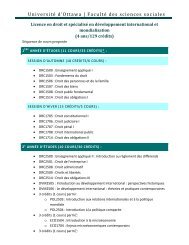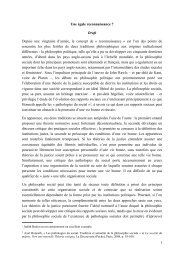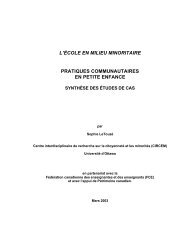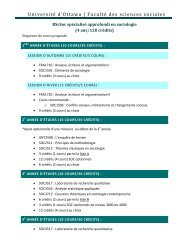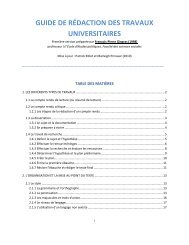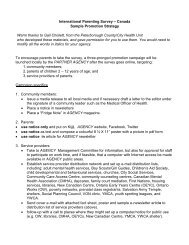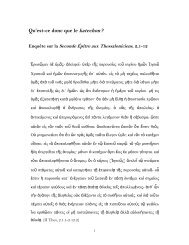Les Clés pour l'adolescence, un programme de promotion de la ...
Les Clés pour l'adolescence, un programme de promotion de la ...
Les Clés pour l'adolescence, un programme de promotion de la ...
Create successful ePaper yourself
Turn your PDF publications into a flip-book with our unique Google optimized e-Paper software.
ehaviours: “it was interesting to see that they still care enough even when they’re in high school to<br />
sort of ‘Oh I don’t want him to see’. ” (Teacher)<br />
One area of risk pointed out by eight out of the nine stu<strong>de</strong>nts concerned hurtful <strong>la</strong>nguage and gossip<br />
about others, reflecting a <strong>la</strong>ck of respect. “Well there’s people in our c<strong>la</strong>ss that like really <strong>la</strong>sh out<br />
sometimes and they’ll say really nasty things. (...) Yeah but they don’t just yell at them, they say things<br />
that are just really <strong>un</strong>nee<strong>de</strong>d.” (Stu<strong>de</strong>nt 13)<br />
It seems that yo<strong>un</strong>g persons of the study age group (12-14 years old) have participated in activities that<br />
involved a “physical” risk. For example, four out of the nine spoke of friends who fo<strong>un</strong>d pleasure in<br />
taking on reckless challenges. “One of my friends, for some reason, he enjoys climbing things, like<br />
schools, and I have no i<strong>de</strong>a why. He enjoys fire, I don’t know.” (Stu<strong>de</strong>nt 15)<br />
Numerous factors have an effect on the reactions of youth confronting these risks and on their<br />
<strong>de</strong>cisions whether to give in to peer pressure. The three most tangible are the influence of parents,<br />
that of peers, and of Skills for Adolescence itself. Parental influence is associated with a <strong>de</strong>sire to<br />
maintain harmony. “And so he <strong>de</strong>ci<strong>de</strong>d to stay behind, and because he did that, one of the other boys<br />
(...) stayed with him. (...) He knows our values (...), he has a good sense of right and wrong and I think he<br />
tries to stick to that.” (Parent 12) The program helped these yo<strong>un</strong>g participants to <strong>un</strong><strong>de</strong>rstand how<br />
peer pressure can present itself and what can be done to co<strong>un</strong>ter such pressure, as expressed by a<br />
stu<strong>de</strong>nt when asked if he thought some of the things they were talking about in Skills for Adolescence<br />
had an effect on him. “ With peer pressure like I don’t know, that’s probably going to be <strong>la</strong>ter on in high<br />
school or something but I think it’s just you know not to get dragged into that you know. To be aware of<br />
it when you see it.” (Stu<strong>de</strong>nt 11) The preventive focus was <strong>un</strong>doubtedly greatly appreciated by the<br />
parents interviewed. “I think it can do nothing but to help to educate them (...), so I think the more they<br />
know, the more prepared they’ll be.” (Parent 12)<br />
It can still be said that risks associated with alcohol, tobacco and drugs fall short of being a major<br />
problem with the participants in this study. The majority of them (seven out of nine, group age 12-14<br />
years old) have yet to be exposed to such consumption outsi<strong>de</strong> their family circle. Within this setting,<br />
they have seen their parents and re<strong>la</strong>tives drink socially and several have even been offered a little<br />
taste of alcohol while on family holidays. The two other stu<strong>de</strong>nts who spoke of more risky behaviour<br />
had heard “through the grapevine” about a friend who smoked marijuana. (Stu<strong>de</strong>nts 7 and 9) Most of<br />
the stu<strong>de</strong>nts have a very negative attitu<strong>de</strong> towards smoking and drug use, <strong>un</strong><strong>de</strong>rscoring how reckless<br />
and <strong>un</strong>healthy it is to indulge. “No thanks, that’s gross, I’ll die.” (Stu<strong>de</strong>nt 11) All the same, they<br />
appear to acknowledge the presence of alcohol on the horizon and admit they may well become social<br />
drinkers by the end of high school.<br />
Emerging results<br />
The content analysis highlighted emerging results from the interviews. Specifically, the respon<strong>de</strong>nts<br />
shared their opinion with regard to the strength of the program and some constraints of<br />
implementation as <strong>de</strong>scribed in the next pages.<br />
Program strengths<br />
According to the teacher, Skills for Adolescence paved the way for a discussion of themes re<strong>la</strong>ted to<br />
adolescence and equipped the participants with a <strong>de</strong>scriptive vocabu<strong>la</strong>ry with which to <strong>de</strong>scribe their


